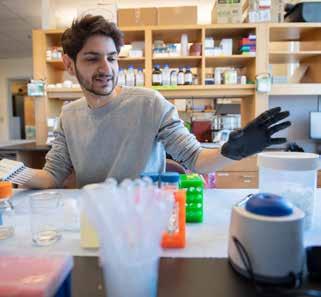
1 minute read
It’s in our nature.
SUSTAINABILITY. For some, it’s little more than a buzzword. At UVM, it’s an ethic core to our character, rooted in Vermont’s tradition of environmentalism, progressive thought, and action. Through education, research, and practice we advance knowledge and application of approaches critical to the health of people and planet. As a student at UVM, principles of sustainability come to life in the courses you take, the buildings where you live and learn, and the commitment you find in our faculty, students, and local community.
WE MEAN GREEN:
Advertisement
#2 Green MBA in the United States, Princeton Review
49% of campus waste is recycled
25% locally resourced food in campus dining halls

Gold-Level Bike Friendly University, League of American Bicyclists
A "Top 20" Green School in the United States, Princeton Review
In Our Research
Melting ice sheets on Greenland, farms across the Northeast, urban planning projects, and new energy development are some of the areas where you’ll find faculty leading research— assisted by undergrads— to unravel sustainability challenges and shape viable solutions, for the world.
In Our Practice
Locally sourced materials— from the slate roof to the maple interior trim—are found throughout the Davis Student Center. Next door, the Aiken Center boasts a green roof, both a teaching resource and a best practice. They are two of fourteen buildings on campus that are LEED-certified, denoting environmentally responsible building practices.
In Our Curriculum
Yes, our Rubenstein School of Environment and Natural Resources, cross-disciplinary Environmental Program, and Gund Institute for Environment are international leaders. But at UVM, sustainability also leaps academic boundaries. Seventy-five percent of UVM departments offer sustainabilityrelated courses, and 100 percent of our undergraduates take at least one sustainability course through our Catamount Core curriculum.
In Our Activism
UVM student voices are strong. Creating and enhancing campus waste recycling programs, ending the sale of bottled water on campus, and divesting from fossil fuel investments are just a few of the sustainability issues where student activism has been pivotal in pushing the university to a higher standard.














